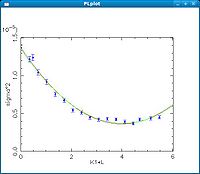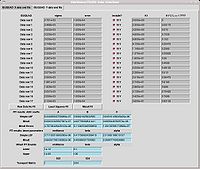Difference between revisions of "Emittance/TWISS parameter extraction"
| Line 27: | Line 27: | ||
== Discussion == | == Discussion == | ||
Since this was a more or symmetric setup the agreement for X and Y beta's/alpha's is encouraging. The emittance agreement is within a factor of two which isn't such an alarming discrepancy. A factor of two agreement for a CEBAF measurement is considered a success, but we have an asymmetric complicated machine. | Since this was a more or symmetric setup the agreement for X and Y beta's/alpha's is encouraging. The emittance agreement is within a factor of two which isn't such an alarming discrepancy. A factor of two agreement for a CEBAF measurement is considered a success, but we have an asymmetric complicated machine. | ||
| + | |||
| + | |||
| + | |||
| + | [[Emittance_Test]] | ||
Latest revision as of 21:10, 22 October 2010
Using the perl/PDL script, beam sizes for Y (quad scan 0) and X (quad scan 1) were measured. These beam sizes were put into a "sdds" file so the nominal CEBAF emittance/TWISS tool could be used to plot and fit the data.
Two fits are performed a simple Least Squares Fit and one based on MINUIT. The LSF is also used to seed the MINUIT fit.
Y plot and the GUI with results for the first quad scan.
X plot and the GUI with results for the second quad scan.
| emittance | beta | alpha | |
| (m-rad) | (m) | ||
| X quad scan1 | 1.3e-6 | 0.35 | 2.0 |
| Y quad scan0 | 3.7e-6 | 0.41 | 2.3 |
Discussion
Since this was a more or symmetric setup the agreement for X and Y beta's/alpha's is encouraging. The emittance agreement is within a factor of two which isn't such an alarming discrepancy. A factor of two agreement for a CEBAF measurement is considered a success, but we have an asymmetric complicated machine.



